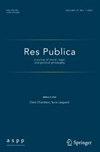The Spectrum of Liability to Defensive Harm and the Case of Child Soldiers
IF 1.1
2区 哲学
0 PHILOSOPHY
Res Publica-A Journal of Moral Legal and Political Philosophy
Pub Date : 2023-10-19
DOI:10.1007/s11158-023-09636-w
引用次数: 0
Abstract
Abstract We typically see child soldiers as not morally responsible because of their age and/or because they are victims of adult exploitation. Work on child soldiers and their moral responsibility is relatively sparse within just war thinking and political philosophy (Thomason in Ethical Theory Moral Pract , 19:115–127, 2016a; Thomason in Seeing child soldiers as morally compromised warriors [Online]. The Critique. Available: http://www.thecritique.com/articles/seeing-child-soldiers-as-morally-compromised-warriors/ [Accessed 2 April 2020], 2016b), and instead focuses mostly on whether child soldiers are liable to attack (McMahan, in Gates, Reich (eds) Child soldiers in the age of fractured states , University of Pittsburgh Press, Pittsburgh, PA, 2010; Vaha in J Military Ethics , 10:36–51, 2011). This paper brings these two areas together. Many of us have the intuition that combatants should exercise at least some constraint when fighting against child soldiers. I will argue that, contra McMahan (2010), exercising restraint in this way is a requirement of justice. I will argue that agents can be more or less liable to attack (liability to attack is on a spectrum) in defensive killing cases depending on how morally responsible they are for the threat they cause. I will outline how, whilst child soldiers are not wholly responsible for the threat they cause to combatants, their responsibility is also not completely diminished. I will argue that child soldiers are therefore liable to attack, but to a lesser extent than fully responsible agents. I will show that combatants fighting against child soldiers are therefore required, as a matter of justice, to use the most proportionate method of attack which may not always be to kill the child soldier. I will conclude that combatants are therefore required, as a matter of justice, to exercise a degree of restraint when fighting against child soldiers.防御性伤害责任范围与儿童兵案例
我们通常认为儿童兵没有道德责任,因为他们的年龄和/或因为他们是成人剥削的受害者。在正义战争思想和政治哲学中,关于儿童兵及其道德责任的研究相对较少(Thomason in Ethical Theory and moral practice, 19:115-127, 2016a;将童兵视为道德妥协的战士[在线]。批判。可获得:http://www.thecritique.com/articles/seeing-child-soldiers-as-morally-compromised-warriors/[访问日期:2020年4月2日],2016b),相反,主要关注儿童兵是否容易受到攻击(McMahan, in Gates, Reich(编辑)支离破碎的国家时代的儿童兵,匹兹堡大学出版社,匹兹堡,宾夕法尼亚州,2010;[J] .军事伦理学,2011,10:36-51。本文将这两个领域结合在一起。我们中的许多人都有一种直觉,即战斗人员在与儿童兵作战时至少应该行使一些约束。我认为,与McMahan(2010)相反,以这种方式行使约束是正义的要求。我认为,在防御性杀人案件中,行为人或多或少会倾向于攻击(攻击的倾向是一个范围),这取决于他们对自己造成的威胁负有多大的道德责任。我将概述,虽然儿童兵对他们对战斗人员造成的威胁不负有全部责任,但他们的责任也没有完全减轻。我认为,儿童兵因此有可能发动攻击,但其程度比完全负责任的特工要小。因此,我将说明,作为正义问题,与儿童兵作战的战斗人员必须使用最相称的攻击方法,这种方法不一定总是杀死儿童兵。因此,我的结论是,作为正义问题,战斗人员在与儿童兵作战时必须保持一定程度的克制。
本文章由计算机程序翻译,如有差异,请以英文原文为准。
求助全文
约1分钟内获得全文
求助全文
来源期刊
CiteScore
1.40
自引率
0.00%
发文量
32
期刊介绍:
Res Publica: a Journal of Legal, Moral and Social Philosophy is an interdisciplinary publication concerned with the philosophical analysis of moral, political, social and legal issues. It provides a forum for discussion of theoretical issues; a public arena for voicing matters of practical concern; and a vehicle for addressing questions of morality, politics, law and society, the interconnections between them and, more generally, the relation of theory to practice. The journal seeks to publish articles and review essays which are both philosophically rigorous and accessible to a wide range of academics and professionals. Replies to articles are welcome. It is the policy of Res Publica to encourage publication by researchers at the beginning of their careers as well as by established scholars; and by those in non-Western countries.

 求助内容:
求助内容: 应助结果提醒方式:
应助结果提醒方式:


